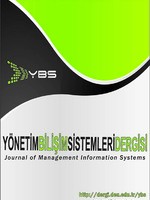OTOMATİK METİN ÖZETLEME İÇİN GENETİK ALGORİTMA TABANLI CÜMLE ÇIKARIMI
Genetik Algoritma, Cümle Çıkarımı, İstatistiksel Metotlar, Metin Özetleme
GENETIC ALGORITHM BASED SENTENCE EXTRACTION FOR AUTOMATIC TEXT SUMMARIZATION
___
- Babar, S. A., & Patil, P. D. (2015). Improving Performance of Text Summarization. Procedia Computer Science, 46, 354-363.
- Binwahlan, M. S., Salim, N., & Suanmali, L. (2009, April). Swarm based text summarization. In Computer Science and Information Technology-Spring Conference, 2009. IACSITSC'09. International Association of (pp. 145-150). IEEE.
- Brandow, R., Mitze, K., & Rau, L. F. (1995). Automatic condensation of electronic publications by sentence selection. Information Processing & Management, 31(5), 675-685.
- Cigir, C., Kutlu, M., & Cicekli, I. (2009, September). Generic text summarization for Turkish. In Computer and Information Sciences, 2009. ISCIS 2009. 24th International Symposium on (pp. 224-229). IEEE.
- Dalal, V., & Malik, L. G. (2013, December). A survey of extractive and abstractive text summarization techniques. In Emerging Trends in Engineering and Technology (ICETET), 2013 6th International Conference on (pp. 109-110). IEEE. Document understanding conferences (DUC) < http://www-nlpir.nist.gov/projects/duc/index.html >
- Edmondson, H. P. (1969). New Methods in Automatic Extraction. Journal of the Association for Computing Machinery, vol. 16, no. 2, pp. 264–285, 1969.
- Edmundson, H. P., & Wyllys, R. E. (1961). Automatic abstracting and indexing—survey and recommendations. Communications of the ACM, 4(5), 226-234.
- Fattah, M. A., & Ren, F. (2008). Automatic text summarization. Gas, 692, 10785. Gholamrezazadeh, S., Salehi, M. A., & Gholamzadeh, B. (2009). A comprehensive survey on text summarization systems. Proceedings of CSA, 9, 1-6.
- Gupta, V., & Lehal, G. S. (2010). A survey of text summarization extractive techniques. Journal of emerging technologies in web intelligence, 2(3), 258-268. Holland, John H. (1975) Adaptation in natural and artificial systems. An introductory analysis with application to biology, control, and artificial intelligence. Ann Arbor, MI: University of Michigan Press
- Khan, A., & Salim, N. (2014). A review on abstractive summarization methods. Journal of Theoretical and Applied Information Technology, 59(1), 64-72.
- Kupiec, J., Pedersen, J., & Chen, F. (1995, July). A trainable document summarizer. In Proceedings of the 18th annual international ACM SIGIR conference on Research and development in information retrieval (pp. 68-73). ACM.
- Kutlu, M., Cıǧır, C., & Cicekli, I. (2010). Generic text summarization for Turkish. The Computer Journal, bxp124.
- Ledeneva, Y., Gelbukh, A., & García-Hernández, R. A. (2008, February). Terms derived from frequent sequences for extractive text summarization. In International Conference on Intelligent Text Processing and Computational Linguistics (pp. 593-604). Springer Berlin Heidelberg.
- Lee, J. H., Park, S., Ahn, C. M., & Kim, D. (2009). Automatic generic document summarization based on non-negative matrix factorization. Information Processing & Management, 45(1), 20-34.
- Lin, C. Y. (1999, November). Training a selection function for extraction. In Proceedings of the eighth international conference on Information and knowledge management (pp. 55-62). ACM.
- Lin, C. Y. (2004, July). Rouge: A package for automatic evaluation of summaries. In Text summarization branches out: Proceedings of the ACL-04 workshop (Vol. 8). Luhn, H. P. (1958). The automatic creation of literature abstracts. IBM Journal of research and development, 2(2), 159-165. Ozsoy, M. G., Cicekli, I., & Alpaslan, F. N. (2010, August). Text summarization of turkish texts using latent semantic analysis. In Proceedings of the 23rd international conference on computational linguistics (pp. 869-876). Association for Computational Linguistics. Salton, G., & Buckley, C. (1988). Term-weighting approaches in automatic text retrieval. Information processing & management, 24(5), 513-523.
- Suanmali, L., Salim, N., & Binwahlan, M. S. (2011). Genetic algorithm based sentence extraction for text summarization. International Journal of Innovative Computing, 1(1). Torres-Moreno, J. M. (2014). Automatic text summarization. John Wiley & Sons. Uy, N. Q., Anh, P. T., Doan, T. C., & Hoai, N. X. (2012, August). A study on the use of genetic programming for automatic text summarization. In Knowledge and Systems Engineering (KSE), 2012 Fourth International Conference on (pp. 93-98). IEEE.
- ISSN: 2630-550X
- Başlangıç: 2015
- Yayıncı: Vahap TECİM
E-MÜŞTERİ ALGILARI ÖLÇEĞİ: GEÇERLİK VE GÜVENİRLİK ÇALIŞMASI
MAKİNE ÖĞRENMESİ ALGORİTMALARI KULLANARAK GİŞE HASILATININ TAHMİNİ
Özge Hüsniye NAMLI, Tuncay ÖZCAN
Aykut ŞEN, Gökhan SİLAHTAROĞLU
GÖRÜNTÜ İŞLEME TABANLI İHA VE UYDU SİSTEMLERİ HİBRİT YAPAY ZEKÂ MODELİYLE KAÇAK YAPILARIN TESPİTİ
SOSYAL GÜVENLİK KURUMUNDA KURUMSAL MİMARİ ÇERÇEVESİNE YÖNELİK MODEL ÖNERİSİ
Ayşe MENTEŞE, İzzet Gökhan ÖZBİLGİN, Yenal ARSLAN
TIBBİ GÖRÜNTÜLEME ARAÇLARI İÇİN BULUT BİLİŞİM TABANLI ÖNGÖRÜCÜ BAKIM UYGULAMA ÇATISI
Selin ÇOBAN, Mert Onuralp GÖKALP, Ebru GÖKALP, P. Erhan EREN
MOBİL TEKNOLOJİ İLE TÜTÜN SÜREÇLERİNDE HIZ VE MALİYET KAZANIMI
TWITTER MESAJLARI ÜZERINDE MAKİNE ÖĞRENMESİ YÖNTEMLERİNE DAYALI DUYGU ANALİZİ
MUTLU PROJE: ADAPTİF DUYGUSAL BİR SOSYO-TEKNİK SİSTEM YAKLAŞIMI
Esra KAHYA ÖZYİRMİDOKUZ, Eduard Alexandru STOICA, Kumru UYAR
OTOMATİK METİN ÖZETLEME İÇİN GENETİK ALGORİTMA TABANLI CÜMLE ÇIKARIMI
Oğuz KAYNAR, Yunus Emre IŞIK, Yasin GÖRMEZ, Ferhan DEMİRKOPARAN
